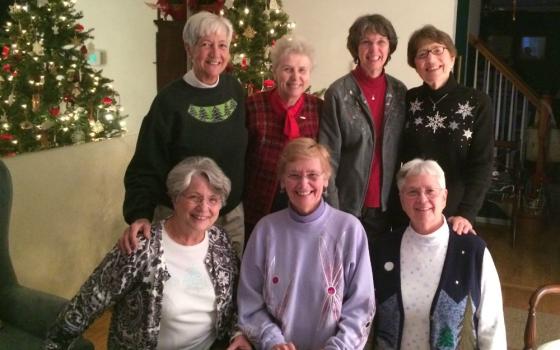Tomorrow (Dec. 28) is the feast of the Holy Innocents, commemorating the male children who were killed in Bethlehem when Herod realized the magi were not returning with information about Jesus. In the midst of my prayer every year around this feast, I always recall my time in the novitiate because this day, we were told, was the feast day of novices, the "holy innocents" of religious life.
I was blessed with an open-minded and free-thinking novice mistress, who read us poetry and sang lullabies and other Irish songs like "Danny Boy." To me, she was a precursor of the mystical writer and Irish poet, John O'Donohue, who asked, "Is there a place where our vanished days secretly gather? I think there is," he said, "and I believe the name of the place is memory."
My memory of our novitiate days is about a time of spiritual formation in the "old days" before and during the first years of Vatican II. I was trained in the "old ways" of begging for soap and toothpaste, cleaning stairs and chapel pews that were virtually dust-free, and seeking pardon on one's knees in the chapter of faults for breaking the grand silence or for other minor infractions. All these practices were performed to nurture humility, obedience, and a sense of dependence on God for all one's needs. For many women religious my age, the novitiate was a time of anxiety and morbid spirituality, but for me the novitiate was mystical bliss.
All our formation directors at the motherhouse were women ahead of their times. For example, during one instruction period, a candidate raised her hand to ask, "I was reading this spiritual book the other day and it talked about a 'particular friendship.' What's that?"
The director casually replied, "Oh, just skip over that part. All friendships are particular." We never received warnings about "not walking in two's, but in three's or more," but we heard about these injunctions from older sisters. In our formation years, friendships were celebrated as the gifts of God that they are.
As O'Donohue wrote, "Friendship in particular should be a wonderful kind of togetherness where each of the friends encourages and liberates each other into the fullness of their own potential." This is the kind of togetherness that I have experienced with some members of my novitiate class for more than 50 years.
Even though most women from my class formally left the congregation that nourished their young religious lives, a small group of us continue to gather for dinner, rotating venues at our various homes each year on Dec. 28. The group has organized reunions of the entire "crowd" to commemorate various decades since entrance into religious life, and gotten together for birthdays, solstice or equinox celebrations, family funerals, plays, book readings and other significant occasions.
These "Holy Innocents," a powerful rock of Gibraltar in my life, sustained me when I faced fierce opposition and rejoiced with me when applause was forthcoming. My Holy Innocents have given me encouragement, tenderness and the light of holy friendship. Without friendship, there is darkness and no shelter from fierce elements.
Friendship is like a stunning landscape where one enjoys every tree and pebble and bush and flower. Walking the roads of life in this kind of landscape is delightful, even enchanting. With loving friends, the human need for belonging is satisfied. Friends steady us, helping us to be ready and secure in decision-making, and calm and adept in follow-through.
Friendship teaches us about accepting differences. We are seven Holy Innocents who are certainly not alike in temperament, religious or ethnic backgrounds, tastes, marital status, sexual orientation, or even political views, but we have learned how to harmonize our diversity. Our friendship has become a threshold at which we celebrate and accept each other as we are.
Friendship has an outer life of the present that sweeps us into each other's lives here and now, and an inner life of memory that unites us in past experiences. As we gathered on Holy Innocents night over the years, artifacts of past memories began to decorate the dinner table and gathering space. The usual glass salt-and-pepper shakers were replaced by porcelain figurines of nuns in traditional veils and long black habits. The modern-day candlesticks turned into novitiate angels bearing torches. Our wine glasses rested on coasters proclaiming some version of "Sister Mary Margarita." We were experiencing the memory of sisterhood as it animated the present.
I believe that religious life is a greenhouse where friendships among members can take root, blossom, be nurtured and flourish. Religious life marries the winters of our solitude, which we all need, with the summers of connections, which lift our spirits. By living, working and praying with the Holy Innocents, I learned early on the deepest meaning of intimacy. Community life provides a space for a safe and comfortable sharing of personal information, a place where trust is built up, and a vast expanse of confidence in one another and of being responsive to others' needs.
As I grow into my wisdom years, I realize more and more the value of having a place where others I call friends share my beliefs, values and ideals. I feel blessed but not unique. I am delighted that others have experienced the blessings of friendship that have graced their lives. Every year as Dec. 28 rolls around, I thank God for the "Holy Innocents" who have been "Holy Friendships" in my life.
[Jeannine Gramick is a Sister of Loretto who has been involved in a pastoral ministry for lesbian and gay Catholics since 1971. She co-founded New Ways Ministry and has been an executive coordinator of the National Coalition of American Nuns since 2003.]

